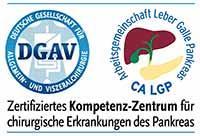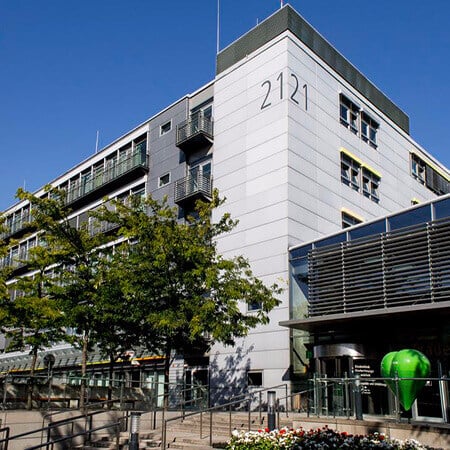Colon Cancer — CRS and HIPEC - Hyperthermic Intraperitoneal Chemoperfusion: treatment in the Best Hospitals of Germany
Treatment prices are regulated by national law of the corresponding countries, but can also include additional hospital coefficients. In order to receive the individual cost calculation, please send us the request and medical records.

Department of General, Abdominal, Transplant, Hepatopancreatobiliary, Colorectal, Endocrine, Bariatric Surgery and Hernia Surgery
The Department of General, Abdominal, Transplant, Hepatopancreatobiliary, Colorectal, Endocrine, Bariatric Surgery and Hernia Surgery provides the full range of services in the areas of its specialization and holds a leading position at the national and international levels in terms of the number of surgical interventions performed and their success. Of particular interest are operations for treating diseases of the bowel, stomach, esophagus, pancreas, liver, gallbladder, and bile ducts, and endocrine glands. The department's doctors have excellent skills in the surgical treatment of cancer, surgery for liver, kidney, pancreas, and small intestine transplants, and operations for morbid obesity. The department's operating rooms are the pride of the medical facility, since they have all the necessary technical options for performing operations with the da Vinci surgical system, image-guided interventions, and endoscopic surgical procedures, which are characterized by minimal trauma rates.







Department of General and Abdominal Surgery, Hepatopancreatobiliary Surgery, Colorectal Surgery, Endocrine Surgery, Hernia Surgery and Bariatric Surgery
The Department of General and Abdominal Surgery, Hepatopancreatobiliary Surgery, Colorectal Surgery, Endocrine Surgery, Hernia Surgery and Bariatric Surgery offers the full range of effective surgical treatments in accordance with modern medical standards. Operations of varying complexity are performed on the stomach, colon, pancreas, liver, gallbladder, bile ducts, rectum, thyroid gland, and parathyroid glands in the department's operating rooms every day. The department's primary focus is the surgical treatment of malignant gastrointestinal tumors. The medical facility is certified in this area by the German Cancer Society (DKG). The team of endocrine surgeons specializes in the treatment of diseases of the thyroid gland, parathyroid glands, and adrenal glands. Patients with morbid obesity are also successfully operated on here. In their work, the department’s specialists primarily use minimally invasive surgical techniques, which virtually eliminate trauma to healthy tissue during the intervention. The department's operating suite is equipped with an innovative da Vinci Surgical System, which allows the doctors to perform sparing and high-precision surgical interventions. The specialists of the medical facility strictly adhere to hygiene and safety standards and create the most comfortable conditions for each patient during their hospital stays.







Department of Abdominal and Colorectal Surgery, Hepatobiliary Surgery, Hernia Surgery, Bariatric Surgery, Endocrine Surgery, Thoracic and Vascular Surgery
The Department of Abdominal and Colorectal Surgery, Hepatobiliary Surgery, Hernia Surgery, Bariatric Surgery, Endocrine Surgery, Thoracic and Vascular Surgery offers the full range of services in these medical fields. It provides surgical treatment of diseases of the gastrointestinal tract, thyroid and parathyroid glands, thoracic organs, vascular system, rectum, anus and colon. In addition, the department performs bariatric interventions for the treatment of morbid obesity. A special focus is made on the treatment of gastrointestinal cancer. Minimally invasive surgical techniques are always preferred, if clinically indicated. The team of the department's surgeons has 8 progressive operating rooms equipped with everything necessary for successful treatment. The department also has the da Vinci Xi surgical system for high-precision minimally invasive robot-assisted interventions. The patient's health is in the safe hands of the best German surgeons who have gone through a rigorous selection and have vast clinical experience.






Colon cancer therapy in Germany is carried out using advanced methods, one of which is the hyperthermic intraperitoneal chemotherapy method (HIPEC). This chemotherapy technique helps in the treatment of malignant neoplasms that have spread from the internal organs to the inner space of the abdominal cavity.
Content
- Colon cancer overview
- Treatment with HIPEC therapy
- Where can I undergo CRS and HIPEC treatment in Germany?
- The cost of treatment in Germany
- How can I undergo CRS and HIPEC treatment in Germany?
Colon cancer overview
Colon cancer is the formation of malignant cells in the lining of the intestinal wall. Colon cancer usually develops from a benign or borderline polyp.
The development of the colon cancer process is not rapid. According to clinical data, it takes cancer cells from 1,5 to 2 years to invade all layers of the intestinal wall. Then the malignant process may affect the pelvic bones, other inner organs and tissues located nearby. Through the lymphatic system, cancer cells can spread throughout the body, forming separate foci of cancer called metastases. They are most often found in the regional lymph nodes, lungs, or liver.
Treatment with HIPEC therapy
Some cancers are very difficult to treat and some of them, until recently, were considered incurable. Tumors that have spread to the abdomen are classified as peritoneal malignancies.
The abdominal cavity is the space in the abdomen that includes the stomach, colon, liver, uterus, ovaries, and other abdominal organs. Cancer cells that are located inside the abdominal organs can spread to the abdominal cavity. This is called peritoneal carcinomatosis or peritoneal metastases and is traditionally considered incurable. Most metastases originate from the abdominal organs, including metastases from colon cancer, appendix cancer, ovarian cancer, pancreatic cancer, and stomach cancer. Although primary cancers of the peritoneum are rare, they include primary peritoneal carcinoma.
The development of cancer therapy techniques has made it possible to improve the primary therapy of peritoneal metastases. Modern cancer treatment has moved on from the old regimens of palliative therapy with chemotherapy or palliative surgery aimed at relieving symptoms to a new era of radical surgery in combination with heated chemotherapy (HIPEC), providing patients with new hope for treatment.
A new approach in therapy of cancer that had spread to the peritoneum combines surgery and chemotherapy during surgery. This treatment approach is the result of long and extensive research showing that some chemotherapy drugs can effectively affect malignant tissues when injected directly into the abdominal cavity.
Some of the chemotherapeutic drugs can kill cancer cells more effectively when heated. There have been many studies on the effects of heat (hyperthermia) on cancer cells. It has shown that heat can stop the growth of cancer cells. The researchers found that therapy using heated to the 42-44 degrees Celsius drugs kill cancer cells with little damage to healthy tissues.
A number of studies in the United States and Europe have shown that colon cancer patients receiving HIPEC therapy increased their life expectancy by more than five years.
In regard to hyperthermic intraperitoneal chemotherapy (HIPEC), the term "intraperitoneal" means that the chemotherapy drugs are delivered directly to the abdominal cavity. The term "hyperthermic" means that the solution is heated to a temperature higher than normal body temperature. Since heated chemotherapy can only penetrate a very limited area of the tumor tissue, it is necessary to remove all visible tumor formations before starting HIPEC.
The HIPEC therapy involves direct contact between malignant cells on the walls of the peritoneum and hot solutions of chemotherapy drugs. Therefore, HIPEC therapy is a two-step process. First, the surgeon removes as much tumor tissue as possible, not including distant metastasis. This intervention is called cytoreductive surgery (CRS) and is aimed at reducing the number of malignant cells. As a result, the cancer intoxication decreases, and the patient's condition improves. The remaining tumor lesions are treated with a chemotherapy drug that is heated up to about 41-42 degrees Celsius.
Tumor cells are more sensitive to heat than healthy cells. Therefore, hyperthermic chemotherapy affects them more. Direct contact between the tumor and the highly concentrated drug solution increases the rate of the drug absorption and the overall efficacy of HIPEC therapy compared to standard intravenous administration of drugs.
In most cases, HIPEC therapy uses a reservoir with a pump, in which the drug solution is heated. The solution is delivered through a drainage tube into the abdominal cavity. The abdominal cavity is open during the HIPEC session, and liquid is removed through a drainage tube introduced from the opposite side.
Surgery to remove colon tumors is lengthy, complex, and includes hot chemotherapy for 90 minutes. Therefore, it is important to make sure that candidates for this type of surgery are eligible for the procedure. For this treatment, only patients who do not have serious heart or pulmonary diseases are eligible.
Where can I undergo CRS and HIPEC treatment in Germany?
Health tourism is becoming more and more popular these days, as medicine in Germany often ensures a much better quality of colon cancer treatment with HIPEC.
The following hospitals show the best success rates in colon cancer treatment with CRS and HIPEC:
- University Hospital of Ludwig Maximilian University of Munich
- Charite University Hospital Berlin
- University Hospital Ulm
- University Hospital Carl Gustav Carus Dresden
- University Hospital Frankfurt am Main
You can find more information about the hospitals in Germany on the Booking Health website.
The cost of treatment in Germany
The prices in hospitals listed on the Booking Health website are relatively low. With Booking Health, you can undergo colon cancer treatment with CRS and HIPEC in Germany at an affordable price.
The cost of treatment varies, as the price depends on the hospital, specifics of the disease, and the complexity of its treatment.
The cost of CRS and hyperthermic intraperitoneal chemotherapy (HIPEC) for colon cancer is between 51,920 EUR and 88,300 EUR.
You also need to consider the cost of possible additional procedures and follow-up care. Therefore, the ultimate cost of treatment in Germany may differ from the initial price.
To make sure that the overall cost of treatment in Germany is suitable for you, contact us by leaving the request on the Booking Health website.
How can I undergo CRS and HIPEC treatment in Germany?
It is not easy to self-organize any treatment abroad. It requires certain knowledge and expertise. Thus, it is safer, easier, and less stressful to shift some responsibility onto a medical tourism agency.
As the largest and most transparent medical tourism agency in the world, Booking Health has up-to-date information about colon cancer treatment with CRS and HIPEC in the best hospitals in Germany. Therefore, we will help you select the right clinic taking into account your wishes for treatment.
We want to help you and take on all the troubles. You can be free of unnecessary stress, while Booking Health takes care of all organizational issues regarding the treatment. Our services are aimed at undergoing colon cancer treatment in Germany with CRS and HIPEC safely and successfully.
Medical tourism can be easy! All you need to do is to leave a request on the Booking Health website, and our manager will contact you shortly.
Authors:
The article was edited by medical experts, board-certified doctors Dr. Vadim Zhiliuk and Dr. Nadezhda Ivanisova. For the treatment of the conditions referred to in the article, you must consult a doctor; the information in the article is not intended for self-medication!
Sources:

